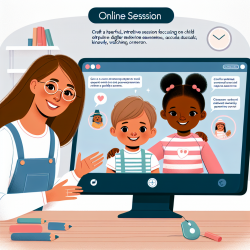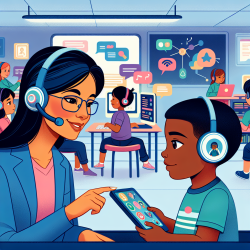As a Special Education Director, my primary focus is on providing safe, effective, and accessible education and therapy services for children with special needs. In recent years, telepractice has emerged as a pivotal resource in our toolkit, especially in ensuring continuity of care and education for kids who require specialized support. This detailed exploration aims to inform and reassure parents about the safety and effectiveness of telepractice as a therapeutic modality for their children.
Telepractice, or online therapy, refers to the delivery of therapy services via telecommunication technologies. This method has been a beacon of hope and progress for many families, offering access to specialized therapists without the constraints of physical location. But, as with any digital innovation, concerns about safety, privacy, and the quality of care can arise. Let's delve into how telepractice addresses these concerns, ensuring a safe and productive environment for our kids.
Understanding the Framework of Telepractice Safety
At the outset, it's crucial to understand that telepractice in therapy is not a makeshift or temporary solution. It is a well-researched, carefully regulated mode of delivering therapy services that meets the same standards of care as in-person therapy. Here are some foundational aspects that contribute to its safety:
- Compliance with Legal and Ethical Standards: Telepractice providers adhere to strict legal and ethical guidelines, including HIPAA (Health Insurance Portability and Accountability Act) in the U.S., to protect patient privacy and confidentiality.
- Use of Secure Platforms: Therapy sessions are conducted on secure, encrypted platforms designed to ensure that interactions between therapists and children remain confidential and safe from unauthorized access.
- Professional Training and Licensure: Therapists providing services via telepractice are required to be licensed and certified, ensuring they meet the professional standards necessary to deliver high-quality care.
Enhancing Safety Through Parental Involvement
One of the unique advantages of telepractice is the opportunity for increased parental involvement. Parents can play an active role in their child's therapy sessions, observing techniques, and learning strategies to support their child's development. This collaboration not only enriches the therapeutic process but also enhances safety by ensuring that parents are informed and engaged participants in their child's care.
Addressing Privacy and Data Security
Protecting the privacy of children and their families is paramount in telepractice. Reputable telepractice providers employ advanced data encryption and secure communication channels to safeguard personal information. Additionally, parents should be informed about the measures they can take to enhance privacy at home, such as using secure internet connections and understanding the privacy settings on their devices.
Quality of Care in Telepractice
The effectiveness of telepractice is supported by a growing body of research indicating that, for many children with special needs, online therapy can be as effective as traditional in-person therapy. Telepractice sessions are tailored to each child's unique needs, utilizing interactive tools and engaging activities designed to facilitate learning and development. Moreover, telepractice can offer access to specialized therapists who might not be available locally, ensuring that children receive the best possible care.
Navigating Telepractice with Your Child
For parents navigating the world of telepractice for the first time, here are some tips to ensure a positive and safe experience:
- Choose a Reputable Provider: Research and select a telepractice service that is well-established and has a track record of providing high-quality, secure therapy services.
- Prepare Your Space: Create a quiet, private area in your home where your child can engage in therapy sessions without distractions.
- Stay Engaged: Whenever possible, participate in your child's therapy sessions. Your involvement can make a significant difference in their progress and the overall success of the therapy.
- Communicate with the Therapist: Maintain open lines of communication with your child's therapist. Feel free to share your observations, concerns, and questions to ensure that your child's needs are being met.
In conclusion, telepractice presents a safe, effective, and flexible option for providing therapy to children with special needs. By understanding the safeguards in place and taking an active role in their child's therapy, parents can feel confident in the benefits of telepractice. As we continue to navigate the evolving landscape of special education and therapy services, embracing innovative solutions like telepractice will be key to ensuring that all children have access to the support they need to thrive.
For parents and educators alike, staying informed and engaged with the latest developments in telepractice can empower us to make the best decisions for the children in our care. Together, we can create a safe, supportive, and effective therapeutic environment for every child.










